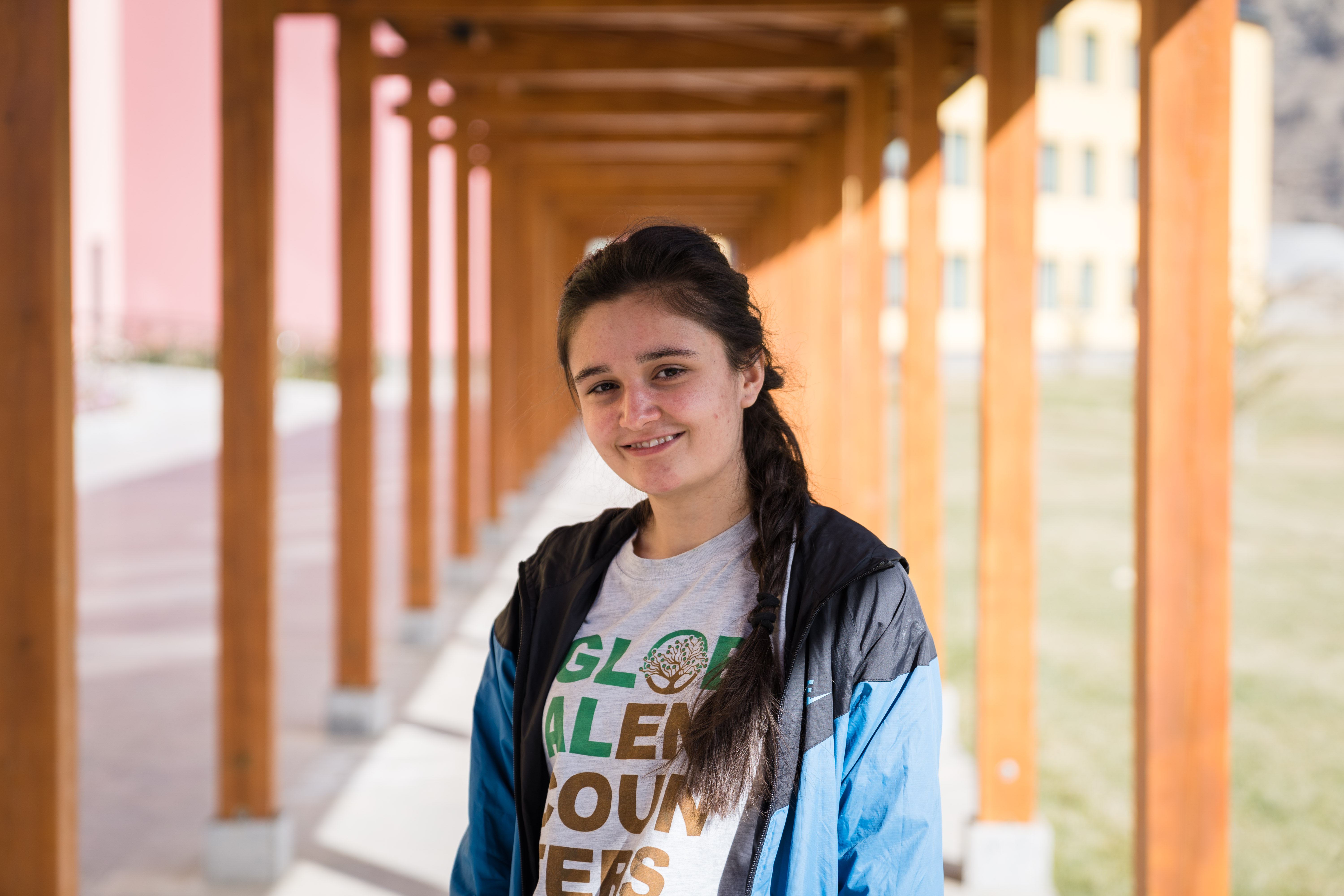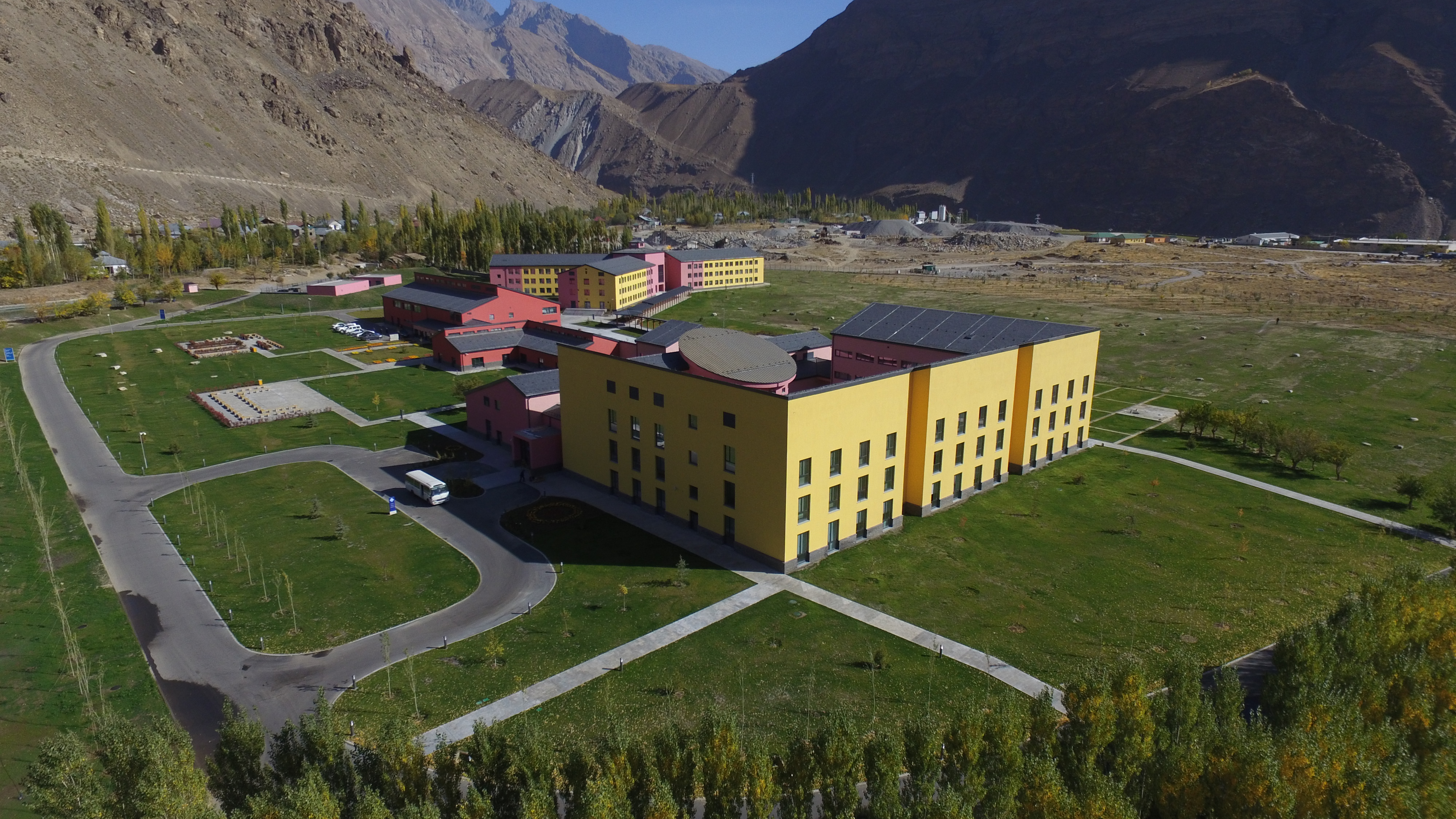In Tajikistan, a landlocked country in Central Asia, over 55% of the population is under 25. While progress has been made to reduce poverty, unemployment remains prevalent and educational institutions struggle to keep up with a rapidly changing global environment. For many, the road to education and employment is a challenging one, especially for the nation’s youth population. Still, young Tajiks dream of building a better future for themselves, starting with a high-quality university education.
For Hangoma, a 19-year-old freshman at the University of Central Asia (UCA), that dream is quickly becoming reality.

Home Away From Home
Hangoma grew up in Khorog, a tiny mountain town in eastern Tajikistan. In 2017, UCA opened its second campus there, welcoming its first cohort of students. Like its sister campus in Naryn, Kyrgyzstan, UCA’s Khorog Campus features state-of-the-art classrooms, dormitory residences, and athletic facilities—all set against the backdrop of the majestic Pamir mountains. As part of the Aga Khan Development Network, the university is unique in its focus on development of the region’s populations, starting with investment in the next generation of Central Asian leaders.
Back before her tiny mountain town could claim a world-class university, Hangoma was an English major at the Aga Khan Lycée in Khorog. There, she worked hard to master her English language skills with the same determination that helped her secure a spot in UCA’s incoming freshman class.
Hangoma earned her place at UCA through a competitive, merit-based admissions process. At UCA, students from mountain communities receive high-quality education valued at $28,000, yet the average students pays less than $1,500. To promote access, the university provides financial aid to every student; and not a single qualified student is denied admission for economic reasons.
Not only does UCA offer substantial financial support, it also matches students with internships each year—an opportunity that Hangoma doesn’t think she would find elsewhere. During her prep year at UCA, she interned with the Aga Khan Foundation Afghanistan in Khorog, focusing on economic inclusion. There, she had an opportunity to visit Afghanistan with her supervisor, where she discovered that the beliefs she held about her country’s neighbor were incorrect.
“We are the same people,” Hangoma explains. “It was really exciting for me to discover.”
She notes this moment as one where she saw a world outside of her own community—a viewpoint that would continue to expand with her university education and her exposure to new cultures.
Making Cultural Connections
Hangoma is proud of UCA’s cultural diversity, noting that the school celebrates national independence days for all countries where its students hail from. Even Syrian Independence Day is celebrated, she says, though only one Syrian student attends UCA Khorog.

She points to the perks of a diverse, pluralistic environment:
“To know each culture is so important. In the future, I would like to visit Pakistan and other Central Asian countries to broaden my view and experience. I know some aspects of these cultures from my peers. I think this is really important for my future—to understand how people from other nations feel and think.”
UCA is preparing this young girl to do just that, while also enabling her and her peers to preserve their own rich cultural heritage as assets for the future.
Investing In the Future
In many ways, Hangoma is not unlike the average college freshman in the United States. She has a youthful idealism, and is full of excitement about the future and the learning opportunities that await her. She talks excitedly about social life on UCA’s campus—chess and debate clubs, health and science fairs, “diversity dinners,” and even Halloween parties.
Yet for other young people in the region, extreme poverty and isolation makes opportunities like attending university difficult to obtain. What might be more accessible to those in urban centers is harder to acquire for people in these hard-to-reach areas. Further exacerbating the region’s vulnerability are the impacts of climate change here—a challenge that UCA hopes its bright young minds will help tackle.
For Hangoma, every UCA student is a future contributor to the mountain region. She sees herself as an aspiring change-maker, committed to one day helping solve local issues, like the town’s poor water management.
“We do have water supply in Khorog,” she says, “but people don’t have access to it or understand how to manage the water to ensure that every citizen has it.” Hangoma plans to focus on water management later in her studies—and mentions other social problems, like increased pollution levels and the burning of plastic, as ones that she hopes to help fix.
These environmental problems are close to home for Hangoma. Even in her young life, she has already witnessed the toll that climate change has taken on her community in the form of natural disasters:
“If there’s not flooding, there’s an earthquake. If there’s not an earthquake, there’s a mudslide. If not that, then there’s something else,” she says. “I know the Aga Khan Agency for Habitat is working on it, and I want to be part of that.” She understands the power of education to promote climate change awareness, helping people to anticipate disasters and understand risks.
Symbol of Hope
For citizens of Khorog, UCA has breathed new life into the quiet town. Not only will UCA deliver skills needed for young people to secure jobs and help develop the region, it also stands as a symbol of hope for a country known more for its past than its present.
In early November 2018, UCA’s Khorog Campus opened its doors to local residents for the first time, inviting them to tour the brand-new campus. Over 5,000 people from Khorog and surrounding areas showed up.
Brahim Fezzani, an Associate Professor of Economics at UCA, described the event: “People of all different ages came to visit. It brought warmth in my heart to witness the older generations coming to see the university and I’m sure that they’re thinking, ‘Our kids are in good hands, our country is in good hands—it’s going to be better.’”
He describes the presence of UCA as a sign of positive cultural, academic, and social change. “I’m quite sure that the older residents feel that ‘Our kids will have a better life than what we had,’” he says. “In general, they are so happy to see what’s happening here.”
A New Chapter
As part of its mission, UCA seeks to contribute leadership, ideas, and innovations to the communities of the region through education and research programs that produce skilled and creative graduates.
Though it is only just beginning, Hangoma’s story is an uplifting example of the power of education to inspire and prepare young people to affect positive change.
And she’s not alone. As Dr. Fezzani notes, UCA’s students are exceptional learners. For the students, UCA’s style of learning—where the emphasis is on creativity and critical thinking—is a deviation from the rote memorization of Soviet-style education. “The students are full of questions, very good questions,” he says. “And when you’re teaching them, you see the wheels turning. They used to memorize things. Now they realize that’s not going to help that much. They are thinking for themselves now. They are learning how to fly on their own.”
For Hangoma and her peers, UCA provides a runway to new heights through higher education.